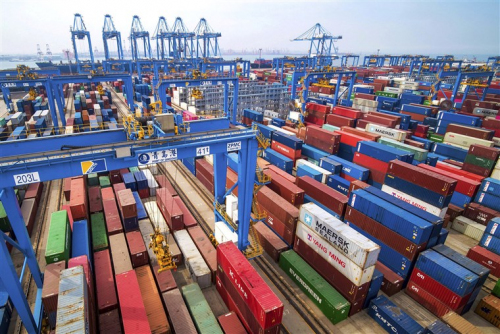SECTOR INSIGHT Shipping & Maritime 22/02/2022
VIN: Protesting Agents Shut Down PTML, Tin-Can Ports For 48hours

Protesting agents on Tuesday continued their shut down of PTML and Tin-Can ports since on Monday following their resentment against the newly introduced Vehicle Identification Number (VIN) valuation system policy of the Nigeria Customs Service (NCS). This is even as the agents however failed in their bid to extend the protest to Apapa ports, Nigeria’s busiest seaport.
As at 4 pm on Tuesday, placard-carrying agents were seen refusing to go for cargo valuation exercises at the PTML and Tin-Can ports axis, singing solidarity songs to drive home their agitation against the VIN policy of the Federal Government.
As at the time of filing in this report, sources close to the Tin-Can Customs Command told Tribune Online that plans are underway to resolve the impasse and ensure the continuation of RORO cargo operations at the affected port terminals.
Chairman, PTML chapter of Association of Professional Freight Forwarders and Logistics of Nigeria (APFFLON), Comrade Jude Darrick Ige told newsmen that plans are ongoing to also cripple operational activities at Kirikiri Lighter Terminals (KLT) on Wednesday adding that the associations have agreed to shut down port operations.
According to him, the peaceful protest will be systematic in approach adding that the protest may likely extend to Harvey Road, Yaba, Lagos.
But the National Public Relations Officer, Nigeria Customs Service, DC Timi Bomodi while reacting to the protest by agents on VIN valuation in a statement late on Monday, accused clearing agents of hypocrisy in the demand for uniform value on imported vehicles.
“In recent times the consensus among clearing agents on the valuation of used vehicles appear to favour a harmonized value system that is consistent across all Customs platforms in Nigeria.
“They insisted that the same make, and model of cars should be made to pay the same amount of duty. These agents also demanded the discontinuation of the discounted value method which allowed for the subjective considerations of officers in the Customs Valuation Unit who rely mainly on the book value of vehicles discounted at a fixed rate over time.
“They demand standardisation but prefer randomised values. They demand simplification of trade processes but prefer a little complication here and there.
“For this lot, the contradictions in their demands make sense so long as it translates to the payment of the least tax to the government. Their propensity to give advice but not to take it smacks of hypocrisy and should be called out by well-meaning Nigerians,” the Customs National Spokesman stated.
According to Bomodi, before the introduction of the VIN policy, a town hall meeting was held across the country about the benefits adding that the service was confident that the innovation in its clearing process will satisfy the desires of agents clamouring for change.
“Before the introduction of this tool, town hall meetings were held across the country stating its benefits, one of the greatest being trade facilitation. Following the demands of agents for a simplified system that recognises standard values, NCS was confident that this innovation in its clearing process will satisfy the desires of agents clamouring for change.
“The resistance to VIN-Valuation, therefore, comes as a surprise seeing that it was deliberately designed to meet their demands. It also compels us to investigate further the intentions of those protesting its use. When our Valuation officers gave out ex-factory prices for duty assessment they were accused of collecting monetary inducements to give lower values.” Bomadi explained.


